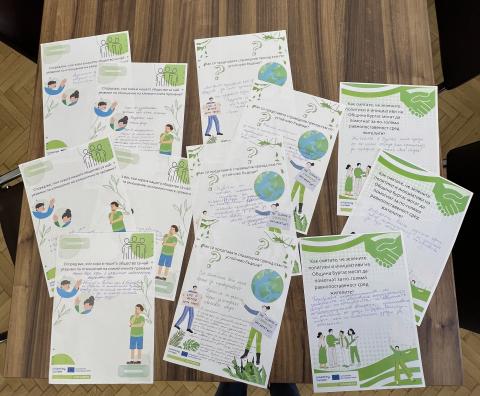Local Stakeholder Meeting #2 - City of Burgas
On January 29, 2025, Burgas Municipality hosted the Second Local Stakeholder Meeting in the JUSTGREEN Project. The meeting, held at the Municipality building, focused on "Just and Inclusive Green Policies in Burgas", highlighting the role of green initiatives in addressing social inequalities and fostering a just transition.
The event gathered 42 participants (23 women and 19 men), including municipal experts, councilors, representatives from non-governmental organizations, high schools, businesses, and directors of social institutions. The discussion was chaired by Ms. Vesna Baltina, Deputy Mayor for Strategic Planning, Ecology, Digitalization, and Climate Adaptation.
Key Discussion Points
Recognizing the broader scope of green policies beyond simple urban greening, the project team steered the discussion towards how municipal green initiatives can effectively support the most vulnerable groups. Participants engaged in a structured dialogue on three critical questions:
- Who are the most vulnerable groups in our society concerning climate change?
- What does a just transition towards a sustainable future look like?
- How can Burgas Municipality’s green policies contribute to greater social equity?
Through these discussions, several high-risk groups were identified, including:
- Elderly residents and children,
- Individuals with disabilities or chronic health conditions,
- Low-income families,
- Residents in industrial areas or neighborhoods with limited access to green spaces.
It was noted that those living near high-pollution zones or areas prone to extreme weather events, such as heatwaves or flooding, face significant climate-related challenges. Additionally, social institutions caring for vulnerable communities were highlighted as key stakeholders requiring targeted support.

Towards a Just Transition: Challenges and Proposals
One of the more complex topics addressed was the definition of 'just transition.' While many participants acknowledged its importance, some policymakers admitted they were still grappling with its practical implications. Several key recommendations emerged:
- Targeted support measures for vulnerable groups.
- Applying the 'polluter pays' principle to waste management fees.
- Introducing stricter regulations for major polluters and compensatory schemes for low-income households.
- Promoting circular economy initiatives to reduce waste and optimize resource use.
- Legislative amendments and stakeholder involvement to ensure fair and effective policy implementation.
- Gradual policy changes to prevent social and economic disruptions.
- Exploring a tourism-based environmental tax to mitigate visitor-related ecological impacts.
Practical Actions for Green Equity
Participants also deliberated on how municipal green policies can foster social justice, generating the following insights:
- Equitable distribution of green spaces across neighborhoods.
- Ensuring that parks and recreational areas are accessible to people with disabilities.
- Community engagement in green project planning through public consultations and grassroots initiatives.
- Financial incentives for cleaner energy adoption, particularly in low-income communities.
- Educational campaigns to raise awareness about climate adaptation among vulnerable groups.
- Enhanced waste separation and recycling programs.
- Restricting construction near wetlands and protected zones.
- Encouraging solar panel installations on rooftops to promote renewable energy use.
Conclusion and Next Steps
The meeting reaffirmed the importance of inclusive environmental policies and the need for broader community participation. Moving forward, the JUSTGREEN Project will continue its series of stakeholder consultations, workshops, and public forums to refine and implement socially just green policies in Burgas. Through active engagement and collaborative policymaking, Burgas Municipality remains committed to creating a sustainable, resilient, and inclusive urban environment for all its residents.
